
Q&A with Cristina Alesci ’01
Cristina Alesci '01 discusses her work as a journalist at CNN and her path there from Pace.

You are a business and politics correspondent for CNN, covering financial markets, economic policy, and political campaigns. How did you become interested in journalism and how did you get started?
I’ve always enjoyed writing and been very curious. I also have a hard time accepting an answer that doesn’t make sense. The result being I ask a lot of questions, which can irritate some people. I’m like that annoying dog who won’t stop barking until she gets a treat. My treat is information.
Journalism was my third job after college. I started writing as a hobby while working full-time, first as a paralegal and then as a sales rep for a major pharmaceutical company. It quickly became an obsession. I enrolled in night classes because I really wanted to get published. For two years, I pitched editors at every New York City publication you could name—and a few you’ve probably never heard of. My first big break was a freelance job editing nightlife listings for the New York Press, which sadly, no longer exists. However, it got my foot in the door and the editors started printing some of the stories I pitched.
The first time I saw my name in a byline was intoxicating—I felt a rush of pride, joy—and relief! It was still a long road from that point to CNN, but from that moment I was hooked.
What is your typical day like and how do you prepare for it?
There’s no such thing as a typical day. I often wake up at 6:00 a.m. with a plan for the day and by 6:15 a.m., it’s blown up. A few hours later I may be sent off to a Senate hearing in Washington, the floor of the New York Stock Exchange, or a farm in the middle of Iowa to cover trade policy.
The only thing you can do to prepare is to get comfortable with the unexpected. In practice, that means reading extensively, always carrying extra battery chargers, and keeping a bag packed at all times.
Journalism today faces many issues and controversies, and the media’s power is constantly being questioned. What do you feel is the role of a journalist and how have you exemplified that in your work?
The public should scrutinize the press and read and watch news critically. It helps us do our jobs better. However, I do take issue with the current vilification of the press. We are not the enemy of the people—we are its eyes, ears and voice. At their core, Americans know that democracy isn’t possible without a free press.
I also protect my sources fiercely—they’re the lifeblood of every story. I make sure to make time for the people who may give me my next lead.
Journalism is often described as the first draft of history. My job, above everything else, is to make sure I have all the facts correct. A lot of that involves triangulating what sources tell me. I also spend a great deal of time thinking about the motivations, merits and unintended consequences of fiscal and monetary policies.
What interviews are you most proud of and why?
A few years ago, I interviewed Ursula Burns, who was raised in a New York City housing project a mile north of Pace. She grew up to become the CEO of Xerox. Her story is amazing and I profiled her for a CNN documentary series I developed called American Dream. A lot of women—and men—have told me how Ursula’s story inspired them to strive and succeed.
What challenges have you faced along the way and how did you overcome them?
A big challenge for anyone in this business is protecting your sources and knowing whether you can trust what they’re telling you. There’s no substitute for time and experience on this one. Personally, I deal with it by exercising discipline. I would rather lose a story to a competitor than publish one I’m not 100% confident is right or that will reveal, or “burn,” my source.
What attracted you to Pace and the study of criminal justice as a major? How did that transition to an interest in a career in journalism? Did you see commonalities between the two?
Pace afforded me a great education in the middle of New York City—and I mean that literally. Pace offered me a partial scholarship, which enabled me to earn my degree without the burden of enormous student loans. Low debt was one reason I was able to take a risk on journalism several years later.
When I first arrived at Pace, my dream was to become an FBI agent. I felt an intense desire to hold powerful people accountable and protect those who were unable to defend themselves. Although I never made it to Quantico, I’m still pursuing my passion—only I use a press pass and a camera instead of a badge and a gun.
Attending college is a significant experience in a person’s life. As you look back at your time as a Dyson student, how did it mold you into the person you are today?
Dyson exposed me to a very diverse student body, both economically and culturally. Many of the students were recent immigrants or first-generation Americans like me, so even though our individual backgrounds were different, we had a commonality that united us. We all wanted to succeed—and the school helped. Through Dyson, I landed an internship with a Wall Street law firm, which was my first exposure to the international financial markets. That experience shaped the rest of my career. I ended up loving finance, which is one of the reasons I still cover it today.
Were any particular faculty members or mentors instrumental in your personal and/or professional journey?
Without a doubt. I would not be a journalist today were it not for my literature professor, Ruth Johnston. She had a passion for her subject that was exciting and had confidence in me. We formed a strong bond that lasted after graduation. I sought her advice over the years and when I was weighing whether to pursue a career as a reporter, she not only pushed me to do it, but practically shoved me through the door of the graduate school where I ultimately studied journalism. She was literally my angel.
Where are you from originally?
I was born in Staten Island, and raised in Brooklyn and Queens. In high school, my parents moved to Long Island, but I couldn’t wait to come back (another reason I went to Pace, by the way).
Dyson students have many options as far as majors that can lead to a career in journalism, including recently, one in digital journalism. As a woman in media, do you have any advice for our female students who wish to follow in your footsteps?
Get comfortable with rejection. Seriously. Editors will deny your pitches, sources will shut doors in your face, and just about everyone else gets annoyed with you. The most successful reporters actually enjoy that kind of rejection because it usually means they’re on to something. Don’t take it personally and keep pushing.
What are some of your biggest goals for the future?
Americans need to love economics and personal finance as much as they do sports and gossip. My goal is to make that happen.
As a board member of the Craig Newmark Graduate School of Journalism CUNY Foundation, I want to ensure that future generations of journalists will have the opportunity to learn the craft of journalism without paying a fortune for that training.
If you haven’t already seen this video, check out Cristina’s interview with some of New York City’s greatest success stories, including Howard Schultz, Alan Greenspan, Mickey Drexler, Russell Simmons, and Ursula Burns, as referenced above.
Pace University Names New Dean Of Dyson College Of Arts And Sciences, School Of Education
NEW YORK AND PLEASANTVILLE, NY (July 28, 2020) – After an extensive nationwide search that included candidates from across the country, Pace University today announced the appointment of Tresmaine R. Grimes, PhD, as dean of the Dyson School of Arts and Sciences and the School of Education.
“Dean Grimes is a student-focused leader with a strong commitment to research, scholarship, and supporting student success.” - President Krislov
In appointing Grimes in a dual role of serving as the new dean of its largest school and the School of Education, President Marvin Krislov cited the native New Yorker’s impressive background in higher education; her steadfast belief in the power of education to transform lives; and her commitment to diversity and inclusion throughout her career.
“Dean Grimes is a student-focused leader with strong commitments to research, scholarship, and student success,” said Pace President Marvin Krislov. “A first-generation college student passionate about supporting other first-gen students and a dedicated mentor to generations of students and colleagues, she has the vision to guide Dyson College and the School of Education into a strong future.”
Grimes was born in Brooklyn and raised in Manhattan. She was the first generation in her family to earn a college degree after a high school guidance counselor saw potential and encouraged her to apply to college. She excelled on campus and earned a Bachelor of Arts from Yale University with a double-major in Afro-American Studies and Psychology. She then pursued her studies at The New School for Social Research where she received a Master of Arts in Psychology, and later earned a Master of Philosophy and doctorate in Developmental Psychology from Teachers College, Columbia University.
Grimes’ rise in higher education is equally as impressive: Her career began at South Carolina State University as a member of the Psychology and Sociology Department. During her nine-year tenure at SC State, Grimes served as chair of the department for four years. In 2000, she joined the faculty of Iona College as an adjunct professor of psychology, and worked her way to become a tenured associate professor of psychology. Seven years later, Grimes was promoted to Assistant Vice President for Academic Affairs at Iona College, a position she held eight years. After Iona, she went to Bloomfield College where she served as Vice President for Academic Affairs/Dean of Faculty and a psychology professor for four years.
In joining the leadership at Pace University, Grimes said she’s excited to fulfill its mission of Opportunitas, and to guide students along a path to academic, professional, and personal success. She looks forward to mentoring students and faculty alike so that they can think, learn, grow, and adapt in a constantly changing global marketplace.
“Education provides us with an opportunity to move beyond our own boundaries and, at times, our self-imposed limitations,” Grimes said. “I’ve had so many opportunities in education and beyond because someone saw something in me. As an educator, I believe it’s my responsibility to open doors for others and encourage people to appreciate the process of learning. I’m so excited to be joining the Pace community.”
Grimes noted that she was impressed with Pace’s top ranking among four year universities in upward economic mobility among four-year private universities, according to a study conducted by Harvard University’s Opportunity Insights, a distinction that is an integral part of the university’s mission and academic DNA, she said.
“Dean Grimes understands all too well that higher education provides life-changing opportunities and is a driver of social mobility,” said Vanya Quiñones, provost, Pace University. “She knows this from experience and has seen it in the thousands of lives she has influenced as an educator. She’s the right fit for our students and faculty and we couldn’t be happier that she’s joined us.”
During her career, Grimes has been particularly dedicated to issues of mental health. In 2004, she was part of a delegation of American mental health professionals that traveled to South Africa to exchange ideas with mental health professionals in that nation. The primary focus of the trip was to study the impact of apartheid-related trauma, sexual assault, and HIV/AIDS on the mental health status of the South African population. Grimes has also served as a grant reviewer for the Department of Health and Human Services and for several faith-based funding initiatives.
Over the years, Grimes has received many awards and recognitions. She was the recipient of the South Carolina Psychological Association Teacher of the Year Award in 1998 and 1999 and was nominated for Teacher of the Year at South Carolina State University in 1996. She is especially pleased that several of her psychology students have gone on to earn doctorates in psychology and related fields. She considers this her contribution to the effort to increase the number of ethnic minority psychologists and mental health professionals in the United States.
In addition to her active professional life, Grimes is a pastor and the founder of a 501(c)(3) nonprofit organization established to provide education to prevent domestic violence in faith-based communities. She and her husband, Clarence, are the parents of two adult children and have two grandchildren. They live in New Rochelle, NY.
About Dyson College: Pace University’s liberal arts college, Dyson College offers more than 50 programs, spanning the arts and humanities, natural sciences, social sciences, and pre-professional programs (including pre-medicine, pre-veterinary, and pre-law), as well as many courses that fulfill core curriculum requirements. The College offers access to numerous opportunities for internships, cooperative education and other hands-on learning experiences that complement in-class learning in preparing graduates for career and graduate/professional education choices.
About Pace University
Pace University has a proud history of preparing its diverse student body for a lifetime of professional success as a result of its unique program that combines rigorous academics and real-world experiences. Pace is ranked the #1 private, four-year college in the nation for upward economic mobility by Harvard University’s Opportunity Insights, evidence of the transformative education the University provides.
From its beginnings as an accounting school in 1906, Pace has grown to three campuses, enrolling 13,000 students in bachelor’s, master’s, and doctoral programs in more than 150 majors and programs, across a range of disciplines: arts, sciences, business, health care, technology, law, education, and more. The university also has one of the most competitive performing arts programs in the country. Pace has a signature, newly renovated campus in New York City, located in the heart of vibrant Lower Manhattan, next to Wall Street and City Hall, and two campuses in Westchester County, New York: a 200-acre picturesque Pleasantville Campus and a Law School in White Plains.
Torturing fewer animals will mean burying fewer people
Professor David Cassuto writes about the ethical and scientific consideration of combating Zoonotic diseases.
Pace University’s Actors Studio Drama School Announces New Program Chair
MFA program enters a new phase of growth and inspired teaching and learning
NEW YORK, N.Y., July 21, 2020 – After fourteen years of excellent service and leadership by Andreas Manolikakis, Pace University announced that Professor Ion Cosmin Chivu has been appointed the new program chair of the Actors Studio Drama School Master of Fine Arts (MFA) program, effective July 1, 2020.
“We are pleased to have Professor Chivu at the helm of the Actors Studio Drama School (ASDS). As a member of the Actors Studio and longtime faculty member of the Pace School of Performing Arts at Dyson College of Arts and Sciences, he brings vast experience to this leadership position that includes his successful career as a director in the theater world. We are looking forward to his innovative ideas for teaching and learning that will inspire ASDS students and faculty alike,” said Richard B. Schlesinger, interim dean, Dyson College of Arts and Sciences.
A tenured associate professor since 2016, Chivu joined the Pace faculty in 2011 as a tenure-track assistant professor in what is now the Pace School of Performing Arts (PPA) with a mandate to create Bachelor of Arts programs in Acting and Directing that would be combined to create an International Performance Ensemble program. He has served as director of this successful program since its inception. A lifetime member of the Actors Studio and a member of the Lincoln Center Directors Lab, Chivu has completed Artist Residency programs with the Drama League, Society of Stage Directors and Choreographers, and the Old Globe Theater in San Diego, and is the founder of InterArt Theatre Group.
Recognized as a vital force in the theater world, Chivu has received multiple awards for his work. He has directed numerous professional and university productions in America, Austria, England, Germany, Greece, Italy, Romania, and Thailand. His production of “The Mutilated” by Tennessee Williams was nominated for the 2014 Drama League Award in the Best Revival category and was a New York Times and Time Out critics’ pick. Other projects include directing “Beautiful Province” by Clarence Coo, winner of the 2012 Yale New Drama Series, presented at Lincoln Center Theater 3; Irwin Shaw's “Bury the Dead” at HERE Arts Center and at the 2014 Sibiu International Festival; and “Something Cloudy, Something Clear” by Tennessee Williams, produced by the Provincetown TW Festival. In America, Chivu has directed more than 30 plays in New York City (Lincoln Center, Cherry Lane, The Actors Studio, HERE Arts Center, UBU Rep, The Players), Massachusetts (The Provincetown Tennessee Williams Theater Festival, Ko Festival), California, and New Jersey.
Chivu has received the Pace International Outstanding Faculty Award recognizing his commitment to internationalizing the curriculum and has been granted Kenan Funding for Faculty Development. He has sponsored and mentored students participating in the Annual Meeting of the Society of Fellows of Dyson College and the Dyson Summer Undergraduate research program, as well as supervising students working on their Honors Theses. He has overseen the PPA Masters Series at Schimmel Center, which brings well-established actors, writers, directors, designers, and theater professionals to Pace to share their craft and invaluable perspectives on the creative process.
Chivu holds a Bachelor in Fine Arts in Theater Arts from the G. Enescu Art Academy, in Iasi, Romania, and a Master of Fine Arts in Dramatic Arts/Directing at the Actors Studio Drama School, then at the New School.
“We want to thank Andreas Manolikakis, who has served as program chair for the Actors Studio Drama School at Pace since the program’s inception in Dyson College in 2006. He has been the steward of the program’s mission and maintained its close connection to The Actors Studio. Please join us in thanking him for his many years of service to ASDS,” said Schlesinger.
About the Actors Studio Drama School, MFA Program: Housed within the Dyson College of Arts and Sciences at Pace University, and the only MFA program created and sanctioned by the Actors Studio, the School offers the authenticity, continuity, and authority of the Stanislavski System and the Method. A fundamental principle of the Stanislavski System and the work of the Actors Studio is to help the artist to discover, liberate, and disclose his or her individual expression. The School provides the special conditions that allow the student-artist to feel safe, to trust, to take risks, and to grow, as delivered through its unique curriculum, superb faculty, and excellent facilities.
About Dyson College: Pace University’s liberal arts college, Dyson College offers more than 50 programs, spanning the arts and humanities, natural sciences, social sciences, and pre-professional programs (including pre-medicine, pre-veterinary, and pre-law), as well as many courses that fulfill core curriculum requirements. The College offers access to numerous opportunities for internships, cooperative education and other hands-on learning experiences that complement in-class learning in preparing graduates for career and graduate/professional education choices.
About Pace University
Pace University has a proud history of preparing its diverse student body for a lifetime of professional success as a result of its unique program that combines rigorous academics and real-world experiences. Pace is ranked the #1 private, four-year college in the nation for upward economic mobility by Harvard University’s Opportunity Insights, evidence of the transformative education the University provides. From its beginnings as an accounting school in 1906, Pace has grown to three campuses, enrolling 13,000 students in bachelor’s, master’s, and doctoral programs in more than 150 majors and programs, across a range of disciplines: arts, sciences, business, health care, technology, law, education, and more. The university also has one of the most competitive performing arts programs in the country. Pace has a signature, newly renovated campus in New York City, located in the heart of vibrant Lower Manhattan, next to Wall Street and City Hall, and two campuses in Westchester County, New York: a 200-acre picturesque Pleasantville Campus and the Elisabeth Haub School of Law in White Plains. Follow us on Twitter or on the Pace News website.
Grant from the National Science Foundation Expands Scientific Opportunities
A new imaging system on the Pleasantville campus provides fresh teaching, learning, and research capabilities.
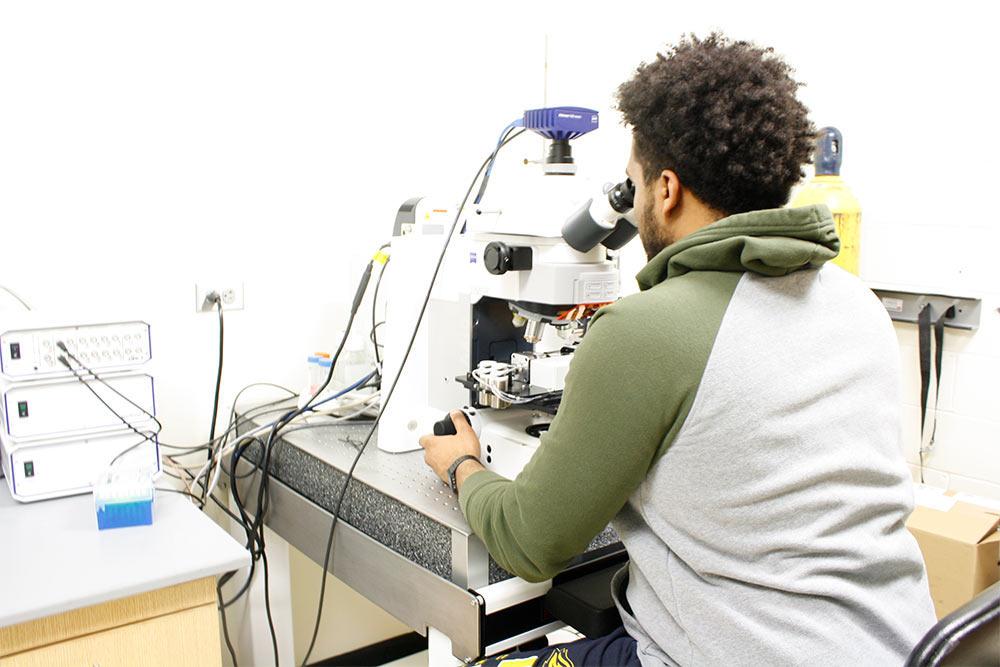
Thanks to a grant from the National Science Foundation, the Dyson College of Arts and Sciences Departments of Biology and Chemistry and Physical Sciences have a new piece of equipment set to dramatically enhance and expand scientific research at Pace.
Described as a high-throughput imaging system, the state-of-the-art device allows faculty and students to gather and measure data that can be used in diverse areas of neuroscience research. It can process a large amount of data quickly, easily, and thoroughly, and gives the Pace science community access to the same microscopy and image analysis capabilities as can be found in laboratories at establishments including the Carnegie Institution for Science in Baltimore and the National Cancer Institute. It was installed on the Pleasantville campus earlier this year.
“It is incredibly convenient and useful for imaging many specimens at one time,” Kristie Oluyemi ’20, a behavioral neuroscience major, said.
Developed at MIT in 2010 and made commercially available by Union Biometrica, the machine will provide students with greater opportunities to experience working with large data sets, collaborate across departments and publish research findings. Some of the data generated will also be used in Pace University’s teaching laboratories to help strengthen STEM students’ quantitative and qualitative research skills.
“This system, in conjunction with the existing infrastructure, will enable us to do experiments that very few academic places have the capability to perform,” Assistant Professor of Biology Sally Marik, PhD said. Professor Marik served as the principal on the grant application. She worked with fellow biology professors Nancy Krucher, PhD and Aaron Steiner, PhD, and Professor of Chemistry Sergey Kazakov, PhD.
Princeton Must Finish What It Started
Professors Alexander K.A. Greenawalt and Bridget J. Crawford co-write an article for The Hill about the Princeton University controversy involving the legacy of Woodrow Wilson’s name.
Q&A with Gerald Olvera ’18
Gerald Olvera ’18 goes from small town American kid, to dedicated Navy Helicopter Crewman, to Sgro Fellow at A&E Network.

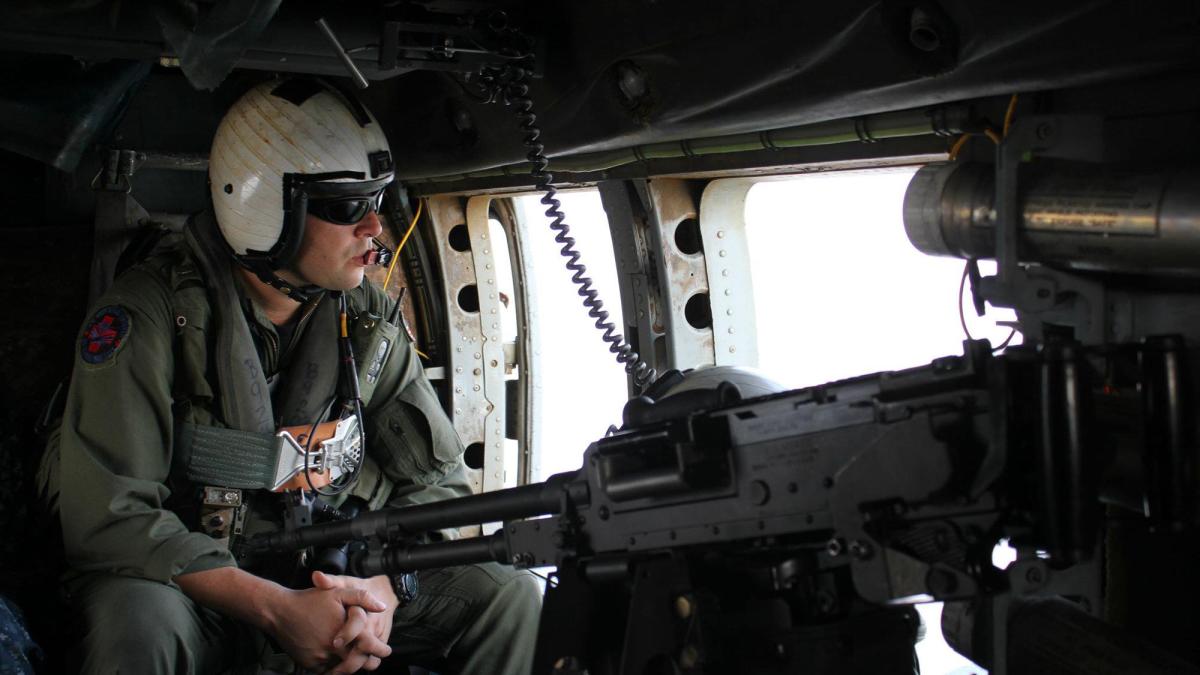
Gerald Olvera ’18 goes from small town American kid, to dedicated Navy Helicopter Crewman, to Sgro Fellow at A&E Network.
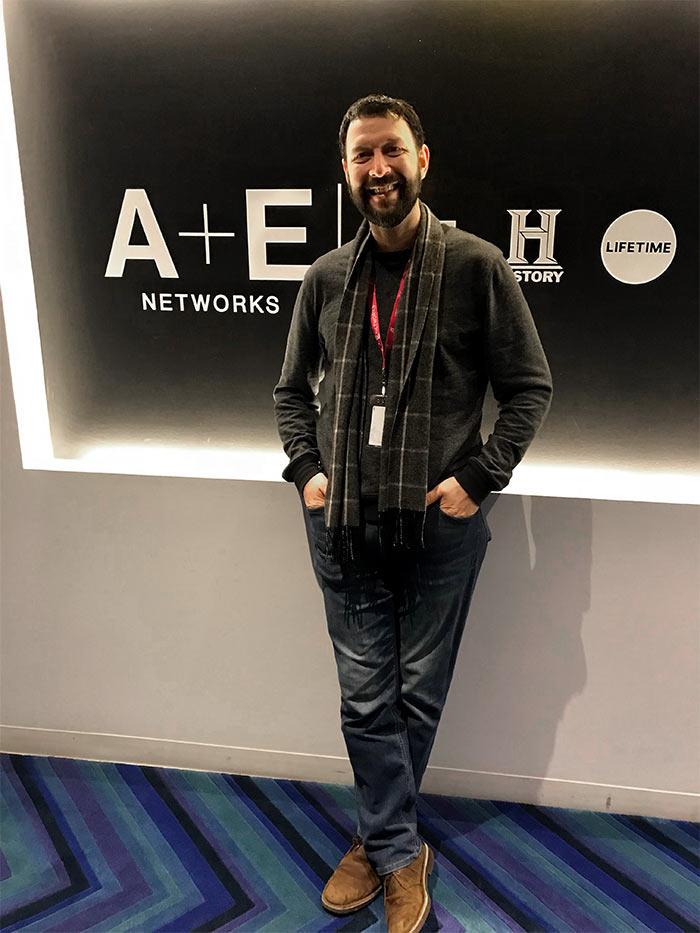
What made you join the Navy, and how did you serve during your nearly 15-year career?
I was born and raised in a small town in Indiana called Rome City. I was always an adventurous, outdoorsy kid with an affection for both water and flight, so after high school, I enlisted in the Navy and became an aircraft mechanic. I first worked on hydraulic and pneumatic systems, and later became a helicopter crewman, so, instead of just working on the aircraft, I started flying in them. I served eleven years on active duty, three years as a reservist, and one year with the State Department. Throughout the eleven years, I circumnavigated the globe three times, went to forty-four countries, and have been on every continent. Before I entered the reserves, I deployed ten times, each for different durations. I really enjoyed my experience.
What did you learn while serving in the Navy?
The military taught me how to learn, meaning how to ingest information quickly, segment it, store it, process it, and then recall it whenever needed. The Navy also gave me the confidence to talk to people, and I think public speaking skills are really important today. After I left active duty, I also wanted to help younger sailors with their careers, so that was great, because it taught me that yes, my career is important, but the future generation is more important than me right now. I still get calls today for advice.
What made you decide to enroll at Pace?
In 2012, I anticipated a downsize in the military, so I planned to become a contractor with the Navy and work as a civilian. The transition to get out of active duty back to civilian life is tough. I visited my brother in Westchester, and he convinced me to stay in New York, for the opportunities he felt were abundant there. I had nothing, but moved and got a couple of part-time jobs right away. College was on my radar, but I did not know where to go. At a social gathering, I met a Pace alumna, and upon learning that I was a vet, she advised me to check out Pace and its beautiful Pleasantville campus, just ten minutes from where I lived. She told me it had a great student veteran program and connected me with Rob Rahni. He saw me right away, and explained from start to finish, how my GI Bill could support me.
What made you choose Liberal Studies as a major and what was your experience as a student like?
I wanted flexibility in my courses, so I selected Liberal Studies as a major. I picked media as a concentration, and signed up for a film editing class, and other communications classes, such as writing for print media and writing for digital media. I fell in love with editing the most. I had many questions, and would often pull aside Professor LaRosa, Media, Communications and Visual Arts (MVCA). She actually took time out of her day to get a hold of people who would help me edit. That was really welcoming, and I became fascinated with it. LaRosa saw my interest and encouraged me to sign up for her Digital Editing II class, a challenge she thought I could handle.
How did you learn about the Sgro Fellowship for veterans in media?
I went to Career Services, and they encouraged me to attend an upcoming Job Fair at the Goldstein Fitness Center. The first booth I saw when I walked in was for the A&E Network. The HR rep told me that I was a perfect candidate for the Sgro Fellowship, but that somebody was already in the program, so she asked if she could hold onto my resume if I was interested. I said, "Absolutely." Months later, I was living in Brooklyn and working as a production assistant when I got the call from A&E. LaRosa was excited for me, and when I told her that I really wanted the job, she said, “We want you to get it, too."
What is the program about and what is your role?
It’s an 18-month rotational program that covers all of global and technical operations, from post-production to engineering, and includes international sales, advertising, marketing, and some IT and cyber security. I’ve also been involved in production and shot a couple of Live PD episodes. Currently, I’m working as a business analyst and quality assurance representative, with a focus on Cloud-based media supply chain management.
How are you connected to MCVA as an alumnus and what advice would you give to current students?
I've literally been popping onto the Pleasantville campus on my way home from Stamford, CT and talking to students, who have been like, "Hey, I know you." I’m also helping two current students with their films, by serving in roles as a veteran who has PTSD and a homeless man who helps a troubled teen find his way back home. We start filming Post-Traumatic on March 30, 2019. This will be an eye-opener for anyone who doesn’t understand the complexities faced by many veterans who suffer from this disorder. The Lighthouse will be filmed in mid-April.
As far as advice, I’d say that you will never understand true potential until you exceed your limitations -- I'm a firm believer in this, because I never thought I was going to be in the position I'm in right now. Don’t waste your time worrying about where you started, visualize where you want to finish. Then, focus on how to get there. Also, don’t forget there is always help, and don’t be afraid to ask. I accepted a lot of help along the way, and I turned around and gave that help back. My goal is to pay it forward by continuing to give that help back.
Pace University Seidenberg School Of CSIS Receives $175,000 Grant From The National Science Foundation
Grant will provide funds for research in wearable technology for healthcare workers
NEW YORK (June 24, 2020) – The National Science Foundation (NSF) has awarded Pace University Seidenberg School of Computer Science and Information Systems Professor Zhan Zhang, Ph.D., a $175,000 grant to research wearable technology for emergency healthcare workers.
“This is my long-standing research interest,” said Professor Zhang, who has been doing research in the healthcare technology field since 2011. “Emergency care work is inherently important to society as it deals with life-threatening injuries and emergency situations. Improving the work efficiency of emergency care will lead to better patient outcomes and decreased medical errors.”
Zhang’s almost decade of work in the field has brought him to his current project: designing and developing novel technologies to support decision making and collaboration in highly dynamic medical environments. In these situations, decisions must be made quickly and acted upon immediately, such as when paramedics work to keep someone’s heart beating while transporting them to a hospital.
Throughout the two-year term of the grant support, Dr. Zhang aims to develop wearable devices that can be used by paramedics to collect real-time patient data in a hands-free manner, and to communicate with emergency room and trauma teams at the receiving hospital. For example, paramedics transporting a patient can use smart glasses to transmit what they are seeing to colleagues awaiting the patient at the hospital. This enables them to act upon observations and instructions delivered by colleagues with relevant expertise. The result would be more efficient and effective patient care until the paramedics could deliver the patient to the hospital.
“In this time of global pandemic, there is no research work more vital than leveraging technology to rapidly diagnose and treat patients. Dr. Zhang’s work will empower emergency medical technicians with real time information to analyze a patient’s condition and apply the best available treatments on the spot,” said Jonathan H. Hill, DPS, Dean of the Seidenberg School of Computer Science and Information Systems.
“I feel extremely excited to work on this challenging yet understudied research problem that has significant scientific and societal impacts,” Professor Zhang added.
About Pace University’s Seidenberg School of Computer Science and Information Systems
At Pace’s Seidenberg School of Computer Science and Information Systems (CSIS), students experience the best of IT education at one of the first comprehensive schools of computing in the nation. Strategically located in the heart of NYC’s tech scene, the Seidenberg School places students on the doorstep of New York’s most promising companies, whether they are established tech giants or exciting new startups. Through partnerships with leading corporations, banks, federal agencies, and global entities, the School's curricula and programs are designed to give students the latest in computer science theory and invaluable hands-on practice to ground it. The faculty includes numerous cybersecurity experts who operate labs and centers providing students with practical experience and connections that lead to impressive internships and jobs.
About Pace University
Pace University has a proud history of preparing its diverse student body for a lifetime of professional success as a result of its unique program that combines rigorous academics and real-world experiences. Pace is ranked the #1 private, four-year college in the nation for upward economic mobility by Harvard University’s Opportunity Insights, evidence of the transformative education the University provides. From its beginnings as an accounting school in 1906, Pace has grown to three campuses, enrolling 13,000 students in bachelor’s, master’s, and doctoral programs in more than 150 majors and programs, across a range of disciplines: arts, sciences, business, health care, technology, law, education, and more. The university also has one of the most competitive performing arts programs in the country. Pace has a signature, newly renovated campus in New York City, located in the heart of vibrant Lower Manhattan, next to Wall Street and City Hall, and two campuses in Westchester County, New York: a 200-acre picturesque Pleasantville Campus and the Elisabeth Haub School of Law in White Plains. Follow us on Twitter or on the Pace News website.
Pace University Seidenberg School Of Computer Science And Information Systems Announces New Cybersecurity Programs

Pace University’s Seidenberg School of Computer Science and Information Systems announced its new Cybersecurity Certificate Programs in conjunction with Cyber Intelligence 4U. The new programming is available in-person and online and can be tailored for individual and organizational needs.
The curriculum fills the gap between the business and technology perspectives and prepares students for new roles in cybersecurity that are needed across the organization. The programs include:
- Enterprise Cybersecurity – Cybersecurity for non-technical roles
- Executive Cybersecurity – C-Level and BoD use cases for effective cyber strategies
- Offensive and Defensive – Gamified Challenges for the Security Team
- Vendor Cyber Risk Management – For Vendor, Procurement and Cyber Managers
- Cloud Security – Best practices for the Security Team
- Mobile Security– Best practices for the Security Team
- Cybersecurity Sales – Transforming sales people into Trusted Cyber Advisors and providing Custom Sales Training
“The worldwide demand for cyber expertise at the business level has already begun to skyrocket,” said Jonathan Hill, Dean of the Seidenberg School of Computer Science and Information Systems at Pace University. “It is not an IT problem anymore; it is the number one business issue that must be addressed immediately.”
“We're excited to these offer cutting-edge courses at Pace”, commented Program Director and Cyber Expert Ariel Evans. “We have over 4000 graduates in the New York Tri-State area over the past two years. Course content is created and taught by unparalleled subject matter experts from leading companies.”
Online cohorts began on May 1, with fresh opportunities for students to participate available in the future. The first in-person cohorts are planned for Fall 2020.
Pace University recently launched a Master of Science in Cybersecurity, beginning in Fall 2020.
To learn more about the program and partnership between Pace University and Cyber Intelligence 4 U, visit the Cybersecurity Certificate Programs page.
About the Seidenberg School of Computer Science and Information Systems at Pace University
At Pace University’s Seidenberg School of Computer Science and Information Systems, students experience a best-of-breed technology education at one of the first comprehensive schools of computing in the nation. Strategically located in the heart of NYC’s tech scene, the Seidenberg School places students on the doorstep of New York’s most promising companies, whether they are established tech giants or exciting new start-ups. Through partnerships with leading corporations, banks, federal agencies, and global entities, the School's curricula and programs are designed to give students the latest in computer science theory and invaluable hands-on practice to ground it. The faculty includes numerous cybersecurity experts who operate labs and centers providing students with practical experience and connections that lead to impressive internships and jobs.
ABOUT Cyber Intelligence 4U
Cyber Intelligence 4U is an educational services company that provides cybersecurity educational programs that fill the gaps in traditional education to universities, organizations, and individuals. The mission of Cyber Intelligence 4U is to increase the cyber resiliency of organizations by training and developing the skills and knowledge of the individuals and enabling them to make strategic decisions regarding cybersecurity management. Cyber Intelligence 4U’s intellectual property is based upon 3 years of research with the Fortune 1000 and cyber insurance industry and curriculum approaches cybersecurity risk from a business perspective. Cyber Intelligence 4U’s Enterprise Cybersecurity Program has graduated over 4,000 students in under two years and is utilized at major universities and organizations worldwide. The technical program offerings provide cybersecurity training and workforce enhancement training for individuals to significantly augment their current cybersecurity skill level.
Pace Launches Revamped MBA
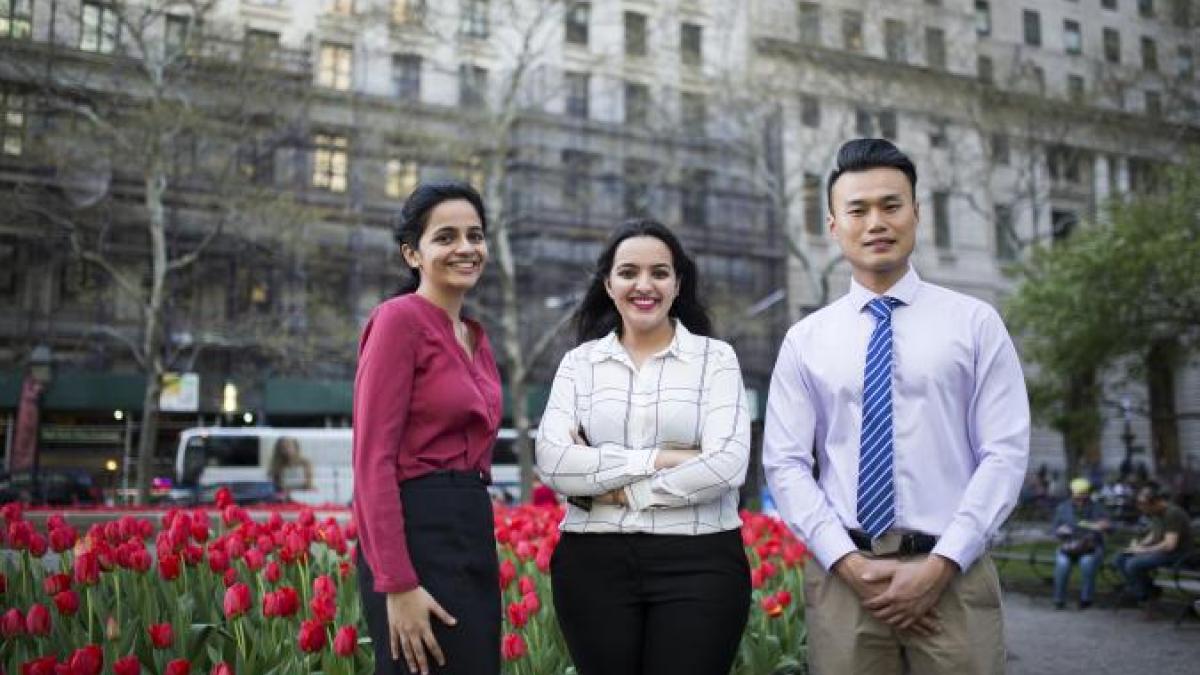
A 21st Century MBA for Changing Times
New Curriculum, Online Courses Offer Flexible, Convenient & Cost-Effective Options for Students and Professionals Seeking to Advance Careers
NEW YORK (May 26, 2020) – Responding to the needs of the workforce, advances in online learning technology, and continuous business evolution and disruption, Pace University’s Lubin School of Business is launching an accelerated and revamped MBA program this fall that is faster, flexible, and more convenient for students, the University today announced.
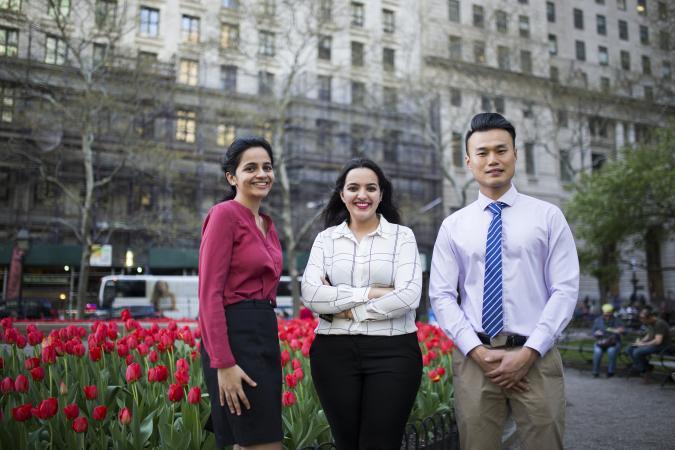
Curriculum: The new and specialized curriculum, which includes in-person classes and an exclusively online MBA option, is ideal for working professionals and people looking to advance their careers. The new MBA requires 39 credits. There will be 10 focus areas including: accounting, business, business analytics, corporate finance, investment management, information systems, marketing analytics, marketing management, talent management, and strategy and international management, all of which are expected to continue to be in great demand for the foreseeable future.
Speed to Degree: Students can earn the new Pace MBA on an accelerated timetable in as little as one year full-time or two years part-time. These options ideally accommodate the professional responsibilities and schedules of students.
Flexibility of Delivery: The program can be completed on campus, online, and with blended options. The MBA in Business option can be completed 100% online. Whether choosing on campus or online delivery, students will still have access to the same world- class faculty and services that Pace offers including career services, internships, events, and a global professional network.
Pace University has an established reputation in the New York City area for preparing students to be competitive, successful, and ready on day one in their careers, and its new MBA options build on this tradition. Pace is ranked the No. 1 private, four-year college in the nation for upward economic mobility by Harvard University’s Opportunity Insights, and the Lubin School of Business is renowned around the world.
“The new MBA requirements provide exactly what professionals need: world-class scholarship from leading professors in their fields that is fast-paced, flexible, and cost-effective,” said Neil Braun, dean of the Lubin School of Business. “We provide real-world experience and hands-on learning with a personalized approach for each student and Pace’s strong regional network of alumni and partners to help them achieve success and meet their career goals.”
“An MBA is a prerequisite for many careers in competitive fields,” Dean Braun continued. “Our new MBA gives full-time students and working professionals studying part-time the opportunity to achieve this flagship degree with many options to fit their circumstances and move their careers to the next level.”
To learn more about the program and specific course offerings, visit the Lubin School of Business.
About Pace University
Pace University has a proud history of preparing its diverse student body for a lifetime of professional success as a result of its unique program that combines rigorous academics and real-world experiences. Pace is ranked the #1 private, four-year college in the nation for upward economic mobility by Harvard University’s Opportunity Insights, evidence of the transformative education the University provides. From its beginnings as an accounting school in 1906, Pace has grown to three campuses, enrolling 13,000 students in bachelor’s, master’s, and doctoral programs in more than 150 majors and programs, across a range of disciplines: arts, sciences, business, health care, technology, law, education, and more. The university also has one of the most competitive performing arts programs in the country. Pace has a signature, newly renovated campus in New York City, located in the heart of vibrant Lower Manhattan, next to Wall Street and City Hall, and two campuses in Westchester County, New York: a 200-acre picturesque Pleasantville Campus and the Elisabeth Haub School of Law in White Plains. Follow us on Twitter or on the Pace News website.
About the Lubin School of Business at Pace University
Globally recognized and prestigiously accredited, the Lubin School of Business integrates New York City’s business world into the experienced-based education of its students at Pace’s suburban and downtown campuses, implemented by one of the region’s largest co-op programs, team-based learning, and customized career guidance. Its programs are designed to launch success-oriented graduates toward upwardly mobile careers.